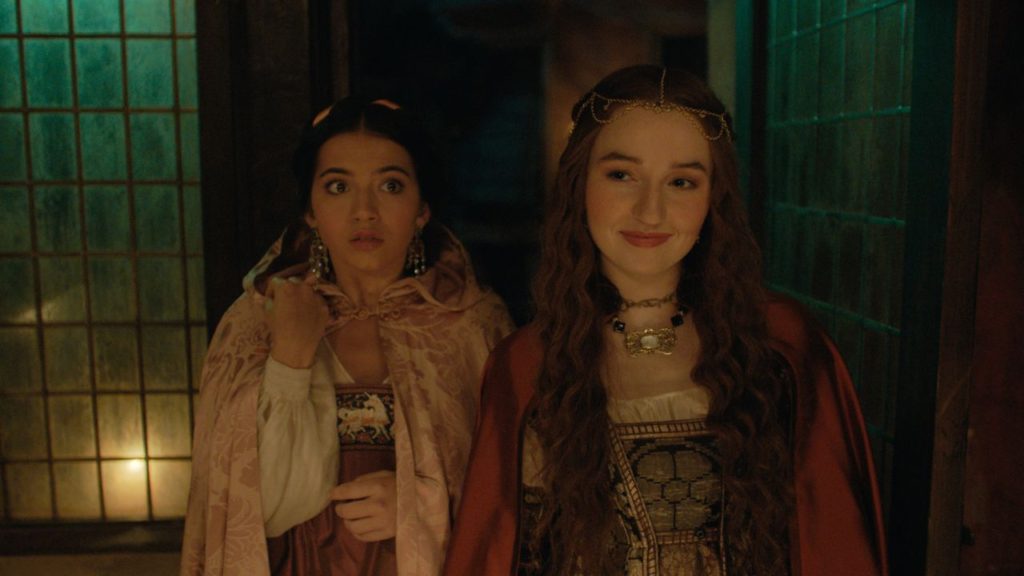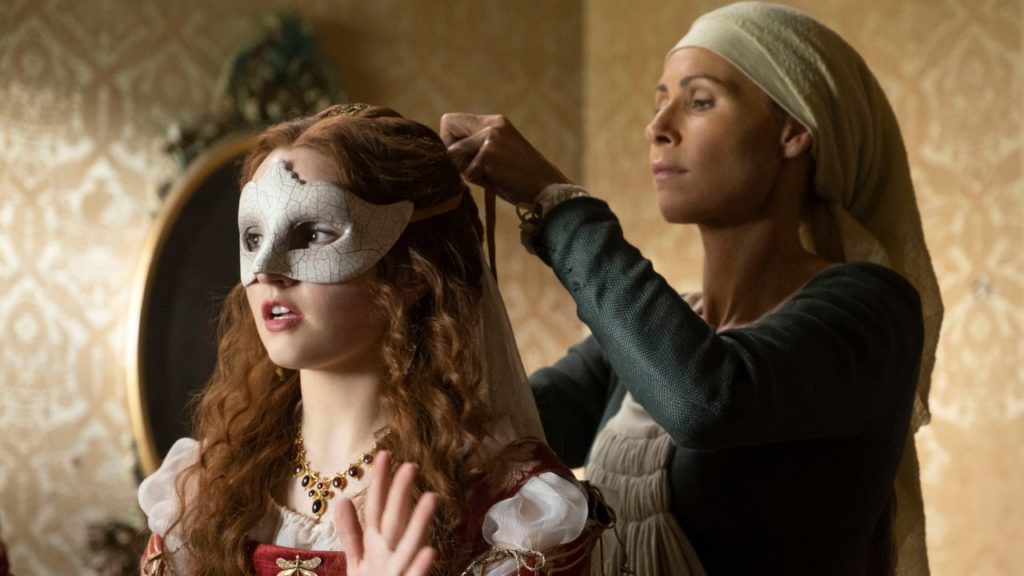We don’t actually meet Rosaline in William Shakespeare’s Romeo and Juliet. She is referenced. She is gossiped about. She is insulted. Mercutio calls her a “pale, hard-hearted wench.” Benvolio thinks her a “crow” alongside other beautiful women. She is an unseen yet incredibly important character. For it is Romeo’s unrequited love for her that leads him to the Capulet gathering where he first spots Juliet. Rosaline is a plot device.
Here, in Karen Maine’s rom-com retelling of Shakespeare’s classic tale of love and tragedy, Rosaline is given more than just a point of view, but actual agency as a character. It might not be the first time the character’s been given the spotlight (see: Still Star-Crossed, Juliet in Mantua, etc.), but it is most definitely one of the funnest and cleverest takes that we’ve yet seen on screen.
Wherefore Art Thou?

Based on Rebecca Serle’s YA novel When You Were Mine, and adapted back into a Shakespearean setting by Michael H. Weber and Scott Neustadter, Rosaline reimagines that greatest of love stories from a different perspective.
The movie begins with a familiar scene. Romeo is spouting poetry at a woman on a balcony, comparing her to the sun and moon, and declaring his undying love. (Was Romeo the OG love bomber? Quite possibly.) The woman in question, Rosaline, isn’t quite as enamored by Romeo’s sonnets and soliloquies. She’s also not ready to return his “I love yous.” She may entertain Romeo’s old fashioned romanticism, but she secretly longs for a freer and more adventurous life. She doesn’t really want to be a wife. She dreams of exploring the world. She has ambitions to be a cartographer. And she couldn’t care less about the petty feud between the Montagues and the Capulets.
A series of conveniently placed rom-com tropes then leads to Rosaline missing a secret rendezvous with Romeo, where he instead meets her cousin, Juliet. You know what happens next. The both of them fall instantly in love. Romeo ghosts Rosaline. Leaving her alone and floundering to a string rendition of “All By Myself.” To add insult to injury, she also has to play the good cousin and suffer the indignity of reintroducing Juliet back into Medieval Veronan society. But Rosaline isn’t one to take any of this lying down. She’s got a cunning plan to corrupt her cousin and sabotage her relationship with Romeo.
Throw in a frustrated but loving father, a distractingly hot new suitor, and a gay best friend, and Rosaline might come off as every other rom-com you’ve seen ever. Only it isn’t. This movie is different because it subverts every one of those tropes. A lesser movie would have built its tension around Rosaline’s plan to break up the star-crossed lovers. Here, Weber and Neustadter use it as merely the starting point of her journey towards realizing that she’s much better off without Romeo.
Parting Is Such Sweet Sorrow

Kaitlyn Dever is a revelation. She is charming and witty. She’s feminine and feminist. Rosaline is a real person, with real desires, fears, insecurities and preoccupations, and Dever’s divertingly droll tone and impeccable comic delivery are the perfect channel all of that independence and sarcasm. After wowing us with gut-wrenching performances in both Unbelievable and Dopesick, I for one am thrilled to see her embrace her comedic side once again.
Rounding out the cast are Kyle Allen and Isabela Merced, who are luminously ditzy as Romeo and Juliet, Bradley Whitford and Minnie Driver, who elevate everything that they’re in, and Sean Teale, who is just effortlessly charming. A special shout out to Nico Hiraga as Steve the Courier who will have you laughing out loud every time he’s on screen.
Much like Bridgerton before it, Rosaline too embraces a more modern approach with its colorblind casting and pop soundtrack. Language is also a key element in this story. Everyone here speaks in a contemporary patois, but do so with a remarkable amount of self-awareness. (Think Mel Brooks.) It is a decision that is cleverly executed with reference to both the context of its time period and the source material.
For I Ne’er Saw True Beauty Till This Night.

By now, we’ve surely seen dozens of modern reinterpretations of William Shakespeare. Rosaline stands apart simply by virtue of how much care and attention has gone into doing it right. Yes, it is very much a feminist take, but it pulls it off without being preachy or provocative. It does so without breaking the period’s strictures, but rather working with them, finding the comedy within, and using it to undermine the era’s inherent misogyny.
Rosaline is a rom-com that leans bravely into the notion that a woman can have both romantic goals and career goals. That finding the right man isn’t the be-all and end-all. But doing so should mean being able to have it all. It is smart. It is empowering. And what’s more, it is funny as all hell.









Follow Us